In the Teeth of the Wind (ePub)
Memoirs of the Royal Navy Air Service in the First World War
Imprint: Pen & Sword Military
File Size: 6.0 MB (.epub)
Pages: 176
ISBN: 9781473815483
Published: 17th October 2013
| Other formats available | Price |
|---|---|
| In the Teeth of the Wind Paperback Add to Basket | £12.99 |
So rapid have been the advances in the science of aeronautics since the end of the First World War that it requires a considerable feat of imagination to cast one's mind back over the comparatively short period of seventy years to the days when Flight Commander Bartlett of the Royal Naval Air Service was flying some of the world's first bombers over the Western Front.
An equal adjustment for those more used to accounts of the nerve-chilling existence of bomber crews in the Second World War is called for when tuning in to the extra ordinarily happy-go-lucky atmosphere which seemed to prevail among these early pilots. Not for them the nail-biting tension as they head over the trenches - rather the schoolboy exuberance of a jolly outing.
Philip Bartlett's account is a unique and fascinating record of a pilot's life in the dawn of aerial warfare and, as history, of the first use of the bomber in war, strangely, by the Navy's aircraft.
Flying by day and night alone, without navigational aids, the author moves from attacks on the U-boat bases to bombing the German Gothas as they prepared to raid London, and then to the support of Haig's drive to the coast which ended in the mud of Passchendaele. The climax in March, 1918, is reached when the author's squadron finds itself directly in the path of Ludendorff's massive thrust, which broke the British Vth Army and nearly decided the War. Attacked by Richthofen's aces, No 5 Squadron RNAS flew continuous and desperate missions against the advancing troops from aerodomes which were over-run time after time.
At a time when the life of a pilot was reckoned in weeks, the author flew 101 missions, enduring the rigours of flying without heating or oxygen, with hesitant engines, no parachutes and the attention of German fighters. Yet there is continual evidence of the pure joy of flying and wonder at the sheer beauty of the the sky.
This is a fascinating and very valuable account of the life of a pilot during the first sustained bombing campaign in history, and will be a good addition to the library of anyone interested in aviation during the First World War.
History of War
So rapid have been the advances in the science of aeronautics since the end of the First World War that it requires a considerable feat of imagination to cast one's mind back over the comparatively short period of seventy years to the days when Flight Commander Bartlett of the Royal Naval Air Service was flying some of the world’s first bombers over the Western Front.
The Pegasus Archive
Philip Bartlett's account is a unique and fascinating record of a pilot's life in the dawn of aerial warfare and, as history, of the first use of the bomber in war, strangely, by the Navy’s aircraft. Flying by day and night alone, without navigational aids, the author moves from attacks on the U-boat bases to bombing the German Gothas as they prepared to raid London, and then to the support of Haig's drive to the coast which ended in the mud of Passchendaele. The climax in March, 1918, is reached when the author's squadron finds itself directly in the path of Ludendorff's massive thrust, which broke the British Vth Army and nearly decided the War.
About Sqn Ldr C P O Bartlett DSC
Lieutenant Commander Nick Bartlett was brought up at Manston Aerodrome in Kent, where his father, the author of the diaries, was adjutant to the airbase. He learned to fly on a tin monoplane, and joined the Navy in 1941, specializing in Marine Engineering.
For five years during the Cold War he was chief of a submarine, and then worked as trials officer for ship refits, followed by several years of lecturing in Scottish schools. He ended his career working in industry. He lives in the Peak District, is married with four children, and fills his time painting and writing.















